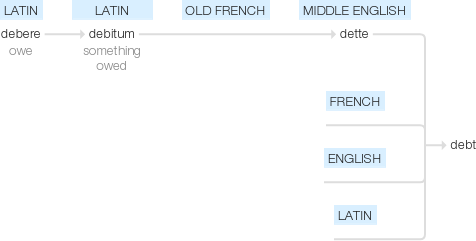Debt
Middle English dette : from Old French, based on Latin debitum ‘something owed’, past participle of debere ‘owe’. The spelling change in French and English was by association with the Latin word.
wiktionary
From Middle English dette, dett, borrowed from Old French dete (French dette), from Medieval Latin dēbita, from Latin dēbitum(“what is owed, a debt, a duty”), neuter of dēbitus, perfect passive participle of dēbeō(“I owe”), contraction of *dehibeō(“I have from”), from de(“from”) + habeō(“I have”). Doublet of debit.
The unpronounced "b" in the modern English spelling is a Latinisation from the Latin etymon dēbitum.
etymonline
debt (n.)
c. 1300, dette, "anything owend or due from one person to another, a liability or obligation to pay or render something to another," from Old French dete, from Latin debitum "thing owed," neuter past participle of debere "to owe," originally, "keep something away from someone," from de "away" (see de-) + habere "to have" (from PIE root *ghabh- "to give or receive").
Meaning "state of being under obligation to make payment" is from mid-14c. Restored spelling after c. 1400. In Middle English, debt of the body (mid-14c.) was "that which spouses owe to each other, sexual intercourse."
